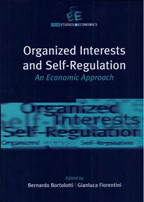Organized interests and self-regulation: an economic approach

01.02.1999
Bernardo Bortolotti, Gianluca Fiorentini
Oxford University Press, FEEM Series on Studies in Economics
The book collects a selection of contributions about the role of
organized interests in collective decision-making. In democratic
settings, organized interests play a role at the legislative stage,
affecting electoral outcome through lobbying activity. While pressure
groups and lobbying are a traditional topic in public choice, the
incentives to set private rules and enforcement through self-regulation
is a less developed research area in political economy. The book
provides a balanced mix of theoretical and empirical papers in
traditional public choice, addressing the issues of how organized
interests affect legislative making, and in self-regulation,
investigating the incentives and the problems related to the private
enforcement of law.
Contributors: B. Bortolotti, G. Fiorentini, L. A.
Franzoni, G. Galeotti, D. Garvie, H-L. Lee, S.P. Magee, P. L. Sacco, C.
Scarpa, R. Van den Bergh
The book collects a selection of contributions about the role of organized interests in collective decision-making. In democratic settings, organized interests play a role at the legislative stage, affecting electoral outcome through lobbying activity. While pressure groups and lobbying are a traditional topic in public choice, the incentives to set private rules and enforcement through self-regulation is a less developed research area in political economy. The book provides a balanced mix of theoretical and empirical papers in traditional public choice, addressing the issues of how organized interests affect legislative making, and in self-regulation, investigating the incentives and the problems related to the private enforcement of law.
Contributors: B. Bortolotti, G. Fiorentini, L. A. Franzoni, G. Galeotti, D. Garvie, H-L. Lee, S.P. Magee, P. L. Sacco, C. Scarpa, R. Van den Bergh
